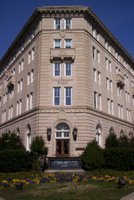March 8, 2006
By Mark Schoeff Jr.*
WASHINGTON (UMNS) - For many years, Foundry United Methodist Church has helped lead an effort to establish a voting representative in Congress for District of Columbia citizens.
Now there's something tangible to rally around: a bill that is being considered this spring on Capitol Hill.
Rep. Tom Davis, R-Va., has reintroduced the D.C. Fairness in Representation Act, which would give the district a fully enfranchised House of Representatives member and would temporarily add a House member to the Utah delegation.
The bill would increase the size of the House from 435 to 437 until the 2010 census, when congressional districts would be reapportioned back to 435 for the 2012 election. Currently, the District of Columbia is represented in the House by a nonvoting member.
Advocates for the measure are pushing for hearings in the House Government Reform Committee, which Davis chairs, and in the House Judiciary Committee, which is chaired by Rep. F. James Sensenbrenner, R-Wis.
If the bill gains traction in Congress, it will mark a milestone for Foundry's efforts on the issue. Foundry was instrumental in getting a D.C. voting resolution revised and readopted at the 2000 United Methodist General Conference. In the resolution, the denomination's top legislative assembly called on the president and Congress "to take action to provide congressional representation to the citizens of Washington D.C. by whatever means they should find suitable and appropriate."
The resolution called on all U.S. United Methodist congregations and church members to support the citizens of Washington and request that their "elected representatives in Congress . demand democratic rights for the District of Columbia."
The resolution also asks all communities of faith across the country to advocate for the effort so that "at last the citizens of the District of Columbia are provided with the same democratic rights available to all other Americans."
"You all have helped keep this issue alive, not only in our city and the Congress but also in the church," said Jim Winkler, top executive of the United Methodist Board of Church and Society, the social action arm of the denomination. Winkler spoke Feb. 19 at a voting rights bill meeting at Foundry church.
So far, Foundry has been advocating the issue in principle, and the Davis bill now provides something to point to when building support in Congress, he noted.
"Now there is something specific you can ask them to do," said the Rev. Mark Schaefer, United Methodist chaplain at American University and former head of the Foundry Democracy Project. "We're hoping to energize the community of faith and tie it to the specific relief we have before us," he said.
'Strategic influence'
The church and society agency will urge United Methodists across the country to contact their representatives and senators, Winkler said. A sample letter will be sent in an Action Alert e-mail to 18,000 subscribers, and the board will include an appeal in its Faith and Action newsletter, which goes to 15,000 people.
If a member of Congress gets a couple of dozen calls on a bill that otherwise wasn't on the radar, it tends to get his or her attention, Winkler said. Even 300 phone calls to congressional offices over the course of a couple of months could make a difference if they're targeted at key politicians, he said.
"The way we look at it is strategic influence and pressure rather than trying to get 8 million United Methodists to arise at once, although I love that idea," Winkler said. "The key is to get enough members of Congress hearing from people."
Although opposition is sure to flare over any proposal to give the District two senators, which likely would be safe Democratic seats, overcoming detractors is not the biggest problem.
"The biggest challenge is interest, it's not opposition," said Ilir Zherka, executive director of DCVote, who spoke at the Foundry event.
A spiritual matter
Winkler suggested presenting the voting issue as a spiritual imperative. He recommended that the issue become part of Sunday liturgies through litanies, statements in sermons and Scripture references.
"We need to figure out ways to go beyond Action Alerts . so that it's not just seen as a political matter," Winkler said. Enfranchisement "is in our Methodist DNA."
Winkler, who had joined other religious leaders in protesting the cuts to social programs under President Bush's budget plan, said a vote from a district congressional representative might have turned the tide against the budget proposal this year, which passed the House 216-214. "If Eleanor Holmes Norton (D.C.'s representative) had been a voting member of the House, we would have been only one vote away from defeating the 2006 budget, which cut many human needs programs."
Bipartisan support
Robert White, a spokesman for the House Government Reform Committee, said the bill has garnered nearly two dozen bipartisan cosponsors.
Davis, chairman of the committee, welcomes the United Methodist Church's efforts to build support for the measure because, like the church, he views a District of Columbia vote in the House as a matter of social justice.
"When you get people who believe in the bill on that level and can explain it to other members of Congress, that's helpful," he said.
White said the committee wants to hold a hearing on the bill soon. The House Judiciary Committee is not planning any action on the bill in the near future.
The Senate
Advocates for the district's voting rights said Senate seats will have to wait for another day. "We can't get the Senate at this moment through this bill," Zherka said. The House vote measure "is a creative, vote-neutral result. That's how you can get movement in a partisan atmosphere."
For now, the focus will remain on the House - and, for Foundry, on the religious underpinnings of the effort. The entire congregation plans to reach out to House members on the fairness in representation legislation.
"People of faith have historically led social justice movements, such as the abolitionist and civil rights movements," said Seth Chase, leader of the Foundry Democracy Project. "The faithful across America should continue their historical mission and lead the movement to grant all Americans representation in Congress."
*Schoeff is a freelance writer in the Washington D.C. area. He is also on staff at the Center for Strategic and International Studies, a bipartisan think tank.
News media contact: Linda Green or Tim Tanton, Nashville, Tenn., (615) 742-5470 or
newsdesk@umcom.org.
 My mother has been sending newspaper clippings to The Boy about Tai Shan, the National Zoo's panda cub also known as Butterstick. So The Boy was pretty eager to see Tai Shan in person on his most recent visit. Tai Shan is an active youngster. He was climbing a tree when we first stopped by to see him.
My mother has been sending newspaper clippings to The Boy about Tai Shan, the National Zoo's panda cub also known as Butterstick. So The Boy was pretty eager to see Tai Shan in person on his most recent visit. Tai Shan is an active youngster. He was climbing a tree when we first stopped by to see him.


